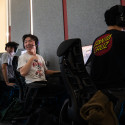Students plan trip along area rivers to promote ‘campfire diplomacy’
A pair of University of Wisconsin–Madison sophomores have organized a three-day bus trip for more than 40 Chinese and U.S. students this weekend, aiming to bring together people from the world’s superpowers through what they call “campfire diplomacy.”
The “River Spirit Exchange” put together Hanning Bi, a native of SuZhou in Jiangsu Province, just north of Shanghai, and Maria Ontiveros, of Bettendorf, Iowa has attracted students from public and private colleges throughout the country.
The trip, planned for Sunday through Tuesday (May 16 to 18), includes observing cranes, canoeing, camping, nature study, Native American rituals, river education and public service in cooperation with local citizens on the Mississippi River in Iowa and on land in Wisconsin. There will be 24 Chinese students in the group, organizers say.
“We see this as an opportunity for our cultures to connect,” says Bi, an economics major whose home is near the lower reaches of the Yangtze River. “This event captures how life along our rivers can be a bridge for understanding each other.”
Gilles Bousquet, vice provost for globalization and dean of the Division of International Studies, who recently met with Chinese delegates from the Anhui Province to initiate water-focused conversations with UW–Madison faculty, welcomes these endeavors.
“Spending time together, participating in a shared project, and linking cultural exchange with environmental appreciation is one of the most important ways we can gain global awareness and respect,” Bousquet says. “These are skills that will last a lifetime.”
Bi says she’s especially excited about the opportunity to tour Devil’s Lake, visit the International Crane Foundation, canoe on the Kickapoo River, camp out with campfires and s’mores, observe rituals at the Ho-Chunk’s Bison Prairie Ranch, sleep on the historic steamboat William M. Black, do a public service project in cooperation with local citizens in Dubuque, then wrap up the trip with a service project in Platteville.
Ontiveros, who grew up near the Mississippi River in the Quad Cities area between Iowa and Illinois, said the title of the weekend trip, “River Spirit Exchange,” captures the goal of the cross-cultural event “to share our knowledge about rivers inherited from our ancestors and to explore new experiences that will connect us in the future.”
This sister-river strategy “is based on the fact that knowledge, beliefs, culture and political economy have shaped and are shaped by the environment, especially rivers that are civilization’s cultural estuaries,” adds Ontiveros, a language major who will study in China this summer.
The trip is free to students, although Bi and Ontiveros are still working to raise funds to cover their budget of about $17,000. So far, they have raised about $15,000 in donations, products, in-kind fees and services, including support from a law firm in China.
The Environment & Public Health Network for Chinese Students and Scholars (ENCSS), established on UW–Madison campus in 2006 and now is an international network with members in 24 states in the U.S. and 27 provinces in China, is organizing the details of the event and helping raise awareness and money. The network has held state, regional and national meetings and organized symposiums and exchanges for a variety of Chinese officials and academics.
ENCSS president Xiaojun Lu says this type of people-to-people diplomacy is important for China-U.S. relations since tensions at higher levels on such issues as currency and trade seem impossible to affect.
“This so-called ‘track two’ type of diplomacy helps build relationships and knowledge between American and Chinese people that can lead to good understandings and better environment and public health results in both countries,” he says.
This is the type of youth and education exchange that UW–Madison Chancellor Biddy Martin said she wanted to encourage after her recent trip to China, he adds. Martin has said the future of U.S.-China relations depends on the relationships that young people build with one another and the quality of their collaborative efforts to solve the genuinely daunting problems of economic and environmental sustainability and peace.
“This is exactly that type of effort,” Lu says. “UW-Madison can make itself known by these types of projects.”
Martin also announced during her recent trip to China that 15 accomplished Chinese student-athletes will spend six months living and studying at UW–Madison as part of a groundbreaking partnership with Beijing University of Sport, the foremost sports, physical education and exercise science institution in China.
Xiaojun added that the River Spirit group expects to have a website that will support networking and make a video record of the event, which they hope to send through official channels to Beijing and Washington with a request to consider how the sister-river concept can complement existing scientific work on the two culturally iconic rivers.
Support and donors for the trip are still needed. Those interested may contact the organizers at hbi@wisc.edu or Ontiveros@wisc.edu.



